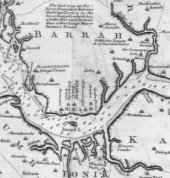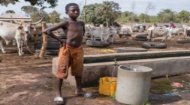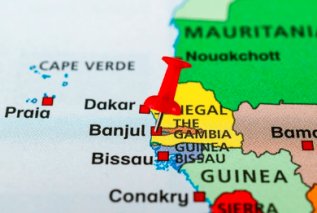|
Banjul Profile |
Banjul Profile |
Banjul Profile | Banjul Profile |
|
|

|
Today, Banjul's social profile is a melting pot of cultures and traditions, with a population of over 7,274 with a metro area population estimated to be 510,000 people. The majority of these are made up of the Mandinka, Fula, Wolof, and Jola ethnic groups. English is the official language, but many locals also speak local languages such as Wolof and Mandinka.
Life in Banjul is characterized by a laid-back atmosphere, with locals going about their daily routines in a relaxed and friendly manner. The city's streets are lined with colorful markets, where vendors sell everything from fresh produce and handicrafts to traditional clothing and souvenirs. Banjul's vibrant food scene offers a wide range of culinary delights, with local dishes such as domoda (peanut stew), benachin (rice with fish and vegetables), and yassa (grilled meat or fish with a spicy onion sauce) being particularly popular. Banjul is home to a variety of tourist attractions that showcase the city's rich history, culture, and natural beauty. Some of the must-visit attractions include the African Heritage Centre, MacCarthy Square, and the Gambia National Museum. Other locations worth a visit include: Arch 22: This iconic arch, located in the heart of Banjul, was built in 1996 to commemorate the country's second coup d'état. Visitors can take an elevator to the top of the arch for stunning panoramic views of the city and the Gambia River. The video provides further insights into Banjul's profile as do the links provided. |
 In 1664 the embryonic colony was ceded to England. The French and British continued to wrangle over trade in the area until it was recognised as a British interest as part of the 1783 Treaty of Paris. The British developed Banjul (then named from 1816 as Bathurst after the 3rd Earl of Bathurst having been known locally as Banjulo) as an alternative base to James Island (right), 18 miles upstream, as it provided a better location to transport goods and slaves between Africa and the Americas. Later that location was used to enforce the abolition of the slave trade still practised by the French, Spanish, Portuguese and Americans as well as securing other British interests in the area. St Mary's Island itself was named after the Portuguese for Santa Maria, its original designation by early Portuguese explorers.
In 1664 the embryonic colony was ceded to England. The French and British continued to wrangle over trade in the area until it was recognised as a British interest as part of the 1783 Treaty of Paris. The British developed Banjul (then named from 1816 as Bathurst after the 3rd Earl of Bathurst having been known locally as Banjulo) as an alternative base to James Island (right), 18 miles upstream, as it provided a better location to transport goods and slaves between Africa and the Americas. Later that location was used to enforce the abolition of the slave trade still practised by the French, Spanish, Portuguese and Americans as well as securing other British interests in the area. St Mary's Island itself was named after the Portuguese for Santa Maria, its original designation by early Portuguese explorers.



 Banjul's economic profile is primarily driven by agriculture, fishing, and tourism. Its deep-water port serves as a major gateway for the import and export of goods, while the city's fish markets are a bustling hub of activity. The tourism industry has also grown significantly in recent years, with visitors drawn to Banjul's rich history, vibrant culture, and beautiful beaches.
Banjul's economic profile is primarily driven by agriculture, fishing, and tourism. Its deep-water port serves as a major gateway for the import and export of goods, while the city's fish markets are a bustling hub of activity. The tourism industry has also grown significantly in recent years, with visitors drawn to Banjul's rich history, vibrant culture, and beautiful beaches. 


